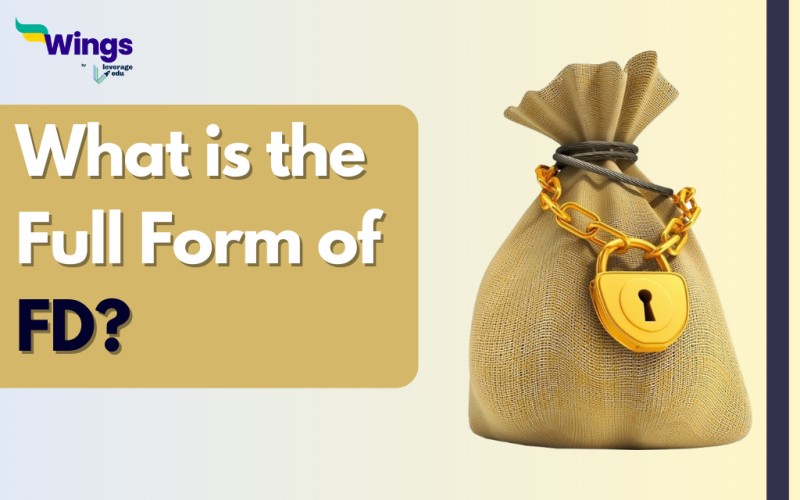FD Full Form: FD stands for Fixed Deposits. Fixed Deposits are one of the most popular ways to save money in India. They are a safe investment that provides decent returns and is simple to open.
So, exactly what is a Fixed Deposit?
In a Fixed Deposit, you deposit a lump sum into your bank for a set period at an agreed-upon rate of interest. You will receive the amount you invested plus compound interest at the end of the term. Another name for FD is ‘term deposits.’
Table of Contents
How Do FDs Work?
A fixed deposit is an investment option with a guaranteed return that is offered by banks, non-banking financial companies (NBFCs), and the India Post Office. It enables you to make a one-time lump-sum investment for a set length of time and receive higher interest than a bank or post office savings account.
Investors can issue FD for 7 days to 10 years. When you deposit with your bank, it begins earning interest based on the length of the deposit. The basic rule of a Fixed Deposit is that funds can be withdrawn before to maturity. However, if you choose to withdraw your FD early, you will be assessed a penalty.
You can choose the time duration for your fixed deposit. In other words, you can keep it open for as long as you have available funds.
Some banks provide a premature withdrawal facility, although this results in a lower interest rate.
The bank credits the main amount and interest to the account holder’s bank account on the maturity date.
Types of FDs
Here are some types of FD (full form Fixed Deposits):
- Standard Fixed Deposit
- Special Fixed Deposit
- Tax Saving Fixed Deposit
- Floating Fixed Deposit
- Senior Citizen Fixed Deposit
Features of an FD
You should now be aware of the following important elements of a fixed deposit to fully comprehend what a fixed deposit is and whether it is appropriate for you:
- The money can only be deposited once. If you want to make more deposits, you should open a new Fixed deposit.
- The interest rate is higher than that of a savings account.
- Fixed deposits can be renewed without difficulty for periods ranging from 7 days to 10 years.
- Withdrawals are not permitted before the maturity period.
- In the event of an emergency withdrawal, the account holder must pay a penalty.
Benefits of FD
Here are some benefits of opening an FD. Check them below:
- It assures returns
- It is easy to open
- Enables people to earn higher rates of interest
- It has a flexible tenure
- You can open multiple FD Accounts
- You also get additional tax benefits.
Who is Eligible to Open an FD?
In India, the following people are eligible to open a Fixed Deposit account:
- Indian residents
- NRI
- Minors
- Senior Citizens
- Partnership Firms
- Companies
- Societies and Clubs
- Sole proprietorship
- Individuals or Joint investors
Taxation on FDs
The interest on fixed deposits is taxed.
It is taxed under the heading “Income from Other Sources” at your appropriate tax rate.
Banks, on the other hand, will deduct TDS (tax deducted at source) at a rate of 10% per year from your interest. This can be deducted when submitting your taxes. When submitting your taxes, calculate your interest income for the year, charge tax based on your income tax slab rate, and then subtract any TDS amount. This is the net tax due. TDS on interest income is only deductible if your total interest exceeds ₹40,000 per year. The ceiling for senior citizens is ₹50,000.
How to Calculate Interests in FDs?
The key components to consider while calculating the interest in FDs are the tenure, Return On Investment (ROI), and the amount invested.
So the return on your FD would be calculated as
FD Interest = Amount invested x Interest Rate x Duration
So let’s say if you invest Rs. 50,000 for a timeline of 1 year, and the interest rate is 6.5% then you will get Rs. 53,300 after a year.
Must Read: What is the Full Form of EFT in Banking?
Why is FD the Ideal Investment?
The following reasons make it the ideal form of investment compared to mutual funds, stock market, cryptocurrency, etc.
- Fixed returns
- Even if the interest rates decrease later, your interest rate will remain the same.
- After a year you can redeposit if you don’t wish to withdraw
- No risk involved.
Must Read: What is the Full Form of IFCI?
FAQ
Corporate Fixed Deposit schemes offer higher returns on your investment, but choosing the right company is imperative.
The full form of FD is Fixed Deposit and the full form of RD is Recurring Deposit. An FD is an investment once a year and an RD is a monthly deposit.
Yes! With the help of short-term FDs, you can open an FD for three months only.
Relevant Blogs
This was all about FD Full form. Visit the General Knowledge page to discover more intriguing articles about full forms. Get in touch with the experts at Leverage Edu in order to kickstart your study abroad journey.
 One app for all your study abroad needs
One app for all your study abroad needs













